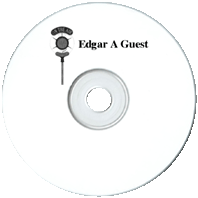

The only person to hold the title of Poet Laureate of Michigan, Eddie Guest was well known as the People's Poet.

26 old time radio show recordings
(total playtime 6 hours, 21 min)
available in the following formats:
1 MP3 CD
or
7 Audio CDs
Text on OTRCAT.com ©2001-2026 OTRCAT INC All Rights Reserved. Reproduction is prohibited.
Edgar Guest
(1881 – 1959)
It takes a heap o' livin’/in a house to make it home,/a heap o' sun, and shadow.

Eddie Guest, the only person to hold the title of Poet Laureate of Michigan, was well known as the People's Poet. His verse was read in the pages of The Detroit Free Press on a daily basis for more than 30 years. Naturally, his words were read and enjoyed by the factory owners in what was becoming the Motor City, but Guest was more comfortable writing for and about lives like that of the drill press operator who toiled to enjoy the simple pleasures afforded to the rising middle class, the simple satisfaction of putting new shoes on a boy getting ready to tromp through the fields of a Michigan autumn.
Edgar Allen Guest was born to Edwin and Julia Wayne Guest in Birmingham, England, 1881. Birmingham was the industrial heart of Great Britain, 
Over the next three years, Guest made his way up the ranks from office boy to cub reporter on the Labor beat, the waterfront beat, and finally the "dog watch" from 3 PM to 3 AM on the police beat. Eddie built a reputation as a scrappy and aggressive young reporter in a competitive town, and by late 1898 he was ready for another promotion to groom his editorial talents. As the newly promoted assistant exchange editor, his job was finding timeless items from other papers which the Free Press could use as filler. Several of the items clipped were bits of verse, and Eddie screwed up his courage to submit a bit of his own poetry to Sunday editor Arthur Mosely. 
Despite the success of his poetry columns, Guest remained a workaday newspaperman until he was the solitary mourner at the funeral of a mentoring journalist. Eddie decided then and there that he would specialize, and from that point forward almost all his writing for the paper was done with rhyme and meter. His readers ate it up and asked for more. When a call for collections of his poems came, he had a discussion with his younger brother Harry who was working as a typesetter for the Free Press. Together, the brothers invested in a small printing press and a case of type and went into the book publishing business. Harry found he had enough type to set eight pages of Eddie's verse, 
Eddie's columns became syndicated and began appearing in more than 300 papers. He began broadcasting a weekly program over a local Detroit station from 1931 to 1942, but he always considered himself a newspaperman. He bragged that "I've never been late with my copy and I've never missed an edition. And that's seven days a week." In 1941, his radio program picked up sponsorship from Land O' Lakes Creameries of Minneapolis and went nationwide three times a week. Guest's poetry reading was supplemented with the singing of Eddie Howard. "A bit of Music, a bit of Verse, a bit of Common Sense, to make your next fifteen minutes a bit brighter."
"... and now just four lines about misers ...
Their money misers closely save
until they carry it to the grave
and nobody learns before they die
what they were saving up buy ..."
[swelling organ exit]
See also: Poetry in Old Time Radio and Moon River.
Text on OTRCAT.com ©2001-2026 OTRCAT INC All Rights Reserved. Reproduction is prohibited.
You have reached the maximum number of votes for a unregistered user.
Please login or create a new account to continue...
You have reached the maximum number to down votes in this page.



Edgar A Guest Disc A001
|
Add Audio CD to Cart - $5.00 |
Edgar A Guest Disc A002
|
Add Audio CD to Cart - $5.00 |
Edgar A Guest Disc A003
|
Add Audio CD to Cart - $5.00 |
Edgar A Guest Disc A004
|
Add Audio CD to Cart - $5.00 |
Edgar A Guest Disc A005
|
Add Audio CD to Cart - $5.00 |
Edgar A Guest Disc A006
|
Add Audio CD to Cart - $5.00 |
Edgar A Guest Disc A007
|
Add Audio CD to Cart - $5.00 |
Please wait...
COMMENTS
Be the first to comment on "Edgar A Guest"
Leave a comment